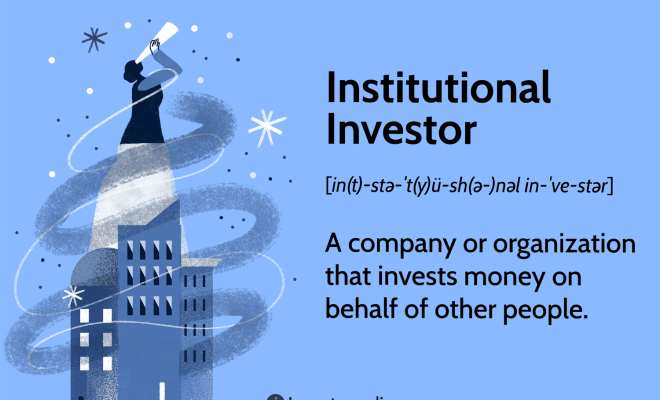What Is an Institutional Investor?

Introduction
In the world of investments, there are various types of investors – individual investors, retail investors, and institutional investors. This article will dive into the world of institutional investors: who they are, their unique characteristics, and why they play such a crucial role in today’s financial markets.
Definition of an Institutional Investor
An institutional investor is an organization or entity that pools together the assets of multiple clients to purchase securities and other investment products. These investors have significant expertise in investments and are responsible for managing large sums of money on behalf of their clients. Due to their vast resources and influence, institutional investors commonly have access to specialized investment vehicles and products not typically available to individual investors.
Types of Institutional Investors
There are several types of institutional investors, each with its own distinct characteristics. They include:
1. Pension funds: These funds manage retirement savings for employees by investing in various assets to provide future benefits.
2. Insurance companies: Through the premiums paid by policyholders, insurers accumulate reserves that are invested in order to meet future claim obligations and support business growth.
3. Mutual funds: These funds pool together resources from numerous individual investors to buy a diversified portfolio of stocks, bonds, or cash equivalents managed by professional money managers.
4. Hedge funds: Unlike mutual funds, hedge funds cater more towards high-net-worth individuals and institutions by utilizing advanced trading strategies aimed at generating high returns.
5. Investment banks: These institutions facilitate major financial transactions, such as underwriting new stocks and bonds or providing advisory services.
6. Endowments and Foundations: These non-profit organizations invest their wealth to fund specific missions or objectives while preserving capital.
Role of Institutional Investors in Financial Markets
Institutional investors play a pivotal role in today’s global financial markets for several reasons:
1. Market liquidity: Their large-scale transactions contribute significantly to market liquidity, enabling more efficient trades for all market participants.
2. Professional management: These investors have access to professional money managers, which can lead to increased efficiency and better investment decisions.
3. Economies of scale: Owing to their large size, institutional investors often enjoy operational cost efficiencies that individual investors cannot achieve on their own.
4. Influence on corporate governance: Due to their stakes in many publicly traded companies, institutional investors can influence corporate governance and decision-making through voting on shareholder resolutions.
5. Enhanced research capabilities: With access to advanced research tools and resources, institutional investors possess better information than individual investors, making them more powerful market participants.
Conclusion
Institutional investors are large-scale organizations that play a vital role in global financial markets. Their significant expertise, access to sophisticated investment products, and vast resources make them influential market players with a unique ability to shape the dynamics of the financial ecosystem. As markets continue to evolve, understanding the role of institutional investors and the impact of their actions is critical for any individual or organization involved in investing or managing assets.






